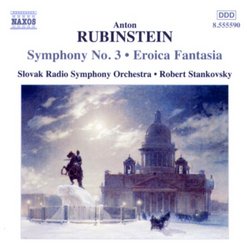| All Artists: Anton Rubinstein, Robert Stankovsky, Slovak Radio Symphony Orchestra (Bratislava), Slovak Radio Symphony Orchestra Bratislava Title: Rubinstein: Symphony 3; Eroica Fantasia Members Wishing: 0 Total Copies: 0 Label: Naxos Release Date: 3/19/2002 Genre: Classical Style: Symphonies Number of Discs: 1 SwapaCD Credits: 1 UPC: 747313559022 |
Search - Anton Rubinstein, Robert Stankovsky, Slovak Radio Symphony Orchestra (Bratislava) :: Rubinstein: Symphony 3; Eroica Fantasia
 | Anton Rubinstein, Robert Stankovsky, Slovak Radio Symphony Orchestra (Bratislava) Rubinstein: Symphony 3; Eroica Fantasia Genre: Classical
|
Larger Image |
CD Details |
CD ReviewsA fine symphony and a less fine orchestral fantasy in good p G.D. | Norway | 03/08/2010 (3 out of 5 stars) "I approached this one with some trepidation. I knew that Anton Rubinstein had written some excellent music (and the opera "The Demon" is a masterpiece), but I also knew that he didn't always manage to stay on the right side of good taste. Thus a half-hour fantasy for orchestra entitled `Eroica' didn't really seem very promising. As it turns out, I cannot honestly say that my fears were completely allayed, although the work - despite its empty blustering - does manage to avoid the deepest pitfalls; it is even worth hearing, in the end, for those interested in high romantic triumphant music (think Liszt's Mazeppa, although Rubinstein's Eroica is less distinguished thematically) and who aren't too concerned with avoiding banality.
The symphony (written in 1855), however, is less ambitious, but thus also less overblown, than some of Rubinstein's works in the genre. The work is tuneful and the thematic material is relatively straightforward, but very fine (although it's hard to remember much of it afterwards apart from the rather stirring opening of the first movement); the composer cannot quite avoid repetitiveness, in particular in the finale, but the writing is usually inventive and varied enough to sustain interest. The scoring is also lighter, more sensitive and less prone to hollow brashness (probably a consequence of the absence of a programme) than in some of his other symphonues. The performances are good; Stankovsky leads a forward-leaning, well-shaped and purposive account and is mostly rewarded by good, if a tad unrefined, orchestral playing; the strings sound thin at times, but the recording might be just as much to blame as the orchestra. The scherzo also suffers a little from heavy-footedness, but at least the playing is overall pretty colorful. The sound quality is constricted and flat, and does, it has to be admitted, undermine some of the orchestral effects in the symphony. Still, this is a worthwhile release of a fine symphony (and a less unequivocally fine orchestral fantasy), recommended to the adventurous." |

 Track Listings (5) - Disc #1
Track Listings (5) - Disc #1